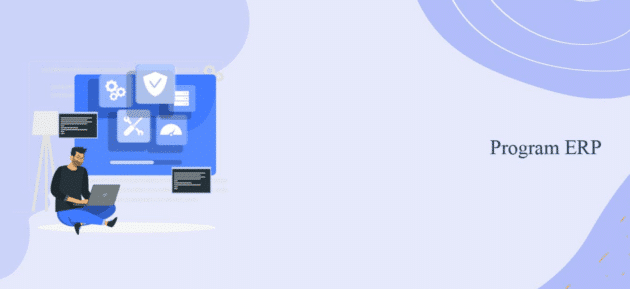ERP Program: Revolutionizing Business Management Across Industries – In today’s rapidly evolving business landscape, companies increasingly turn to technological solutions to streamline operations, improve productivity, and gain a competitive edge. One such solution is the ERP program, a powerful tool that integrates various business processes into a cohesive system. ERP (Enterprise Resource Planning) programs have transformed how organizations manage resources, enabling better decision-making, efficiency, and visibility across departments.
This article explores an ERP program, its key features and benefits, and how it helps organizations of any size or industry operate more effectively.

What is an ERP Program?
An ERP program is a software platform that integrates multiple business functions into a unified system. It manages various business processes, including finance, human resources, manufacturing, supply chain, procurement, sales, and customer relationship management (CRM). The central idea behind ERP is to break down information silos within an organization by creating a single source of truth. This allows for real-time data sharing across departments, ensuring that every part of the business is aligned and informed.
ERP programs are designed to improve efficiency by automating manual tasks, reducing redundant data entry, and providing accurate, real-time information to decision-makers. Over time, ERP systems have evolved from basic inventory control systems to comprehensive platforms that support virtually every aspect of business operations.
How Does an ERP Program Work?
An ERP program consolidates data from different departments into a single database. This database is a centralized repository that stores information related to various business functions. Employees across departments can access the same data, which ensures consistency and eliminates the need for duplicate records.
The ERP program comprises several modules that are responsible for managing a specific business function. Some standard modules in an ERP system include:
- Financial Management: Handles accounting, budgeting, cash flow, and financial reporting.
- Human Resources (HR): Manages employee data, payroll, benefits, and recruitment.
- Manufacturing and Production: Manages production schedules, work orders, and shop floor activities.
- Supply Chain Management: Oversees procurement, inventory management, and logistics.
- Customer Relationship Management (CRM): Tracks sales, marketing, and customer service activities.
- Project Management: Helps plan, execute, and monitor projects to ensure timely delivery.
- Analytics and Reporting: Offers real-time insights and customizable reports for decision-making.
The ERP system integrates these modules, allowing seamless data sharing across departments. For example, when a sale is made, the ERP program automatically updates the inventory, creates an invoice, records the sale in financial records, and notifies the production team if more products need to be manufactured. This automation ensures synchronization of all processes, reducing errors and improving overall efficiency.
Key Features of an ERP Program
Centralized Data Management One of the most critical features of an ERP program is its ability to provide a centralized database. This ensures that all departments work with the same data, reducing the chances of errors and discrepancies. For example, finance, sales, and operations teams access the same information, making collaboration more effective and ensuring consistency across the organization.
Automation ERP programs automate various business processes, from invoicing to payroll, procurement, and inventory management. By automating routine tasks, ERP programs free employees to focus on higher-value activities, reducing administrative burdens and improving productivity.
ERP programs offer integration across departments, enabling seamless communication between business functions. For example, the sales team can see current inventory levels, and the production team can plan their activities based on real-time sales data. Integration reduces delays caused by manual data transfers between systems.
Real-Time Reporting and Analytics Modern ERP programs offer robust reporting and analytics capabilities, providing real-time insights into key business metrics. Customizable dashboards allow managers to track key performance indicators (KPIs), identify trends, and make data-driven decisions. With access to real-time data, businesses can respond quickly to market or internal operations changes.
Scalability ERP programs are designed to scale with the business. The ERP system can easily accommodate additional users, departments, and locations as a company grows. This scalability ensures that the ERP program remains relevant and capable of supporting the business as it expands.
Customization While ERP programs offer out-of-the-box functionality, they can also be customized to meet a business’s specific needs. This customization may involve configuring workflows, adding new modules, or integrating the ERP system with third-party software. The flexibility of ERP programs allows businesses to tailor the system to their unique processes and requirements.
Cloud-Based Solutions Many ERP programs now offer cloud-based deployment options. Cloud-based ERP systems provide several advantages, such as lower upfront costs, automatic updates, and the ability to access the system from anywhere with an internet connection. Cloud ERP also enhances collaboration by allowing remote teams to work together seamlessly.
Benefits of an ERP Program
Increased Efficiency and Productivity By automating repetitive tasks and integrating business processes, an ERP program helps companies streamline operations and reduce manual workloads. Employees can access the information they need quickly, which improves productivity and enables faster decision-making.
Better Decision-Making With access to accurate, real-time data, managers and executives can make informed decisions that drive the business forward. ERP programs provide valuable insights into all aspects of the company, from financial performance to supply chain efficiency, enabling more strategic planning and problem-solving.
Improved Collaboration: An ERP program’s integration capabilities ensure that departments are no longer isolated and that communication and collaboration are spread across the organization. Teams can share information quickly on projects and align their activities with overall business goals.
Reduced Costs ERP programs help businesses reduce costs by optimizing resource use, improving inventory management, and automating manual processes. Bus companies reduce waste, avoid stockouts, and improve operational efficiency with better control over production schedules and supply chain activities.
Enhanced Customer Service The CRM module within an ERP program helps businesses manage customer interactions more effectively, leading to improved customer satisfaction. By providing a 360-degree view of customer activities, companies respond to inquiries quickly, resolve issues efficiently, and deliver personalized service.
Regulatory Compliance Many industries are subject to strict regulatory requirements, and an ERP program can help businesses stay compliant by maintaining accurate records, generating reports for audits, and ensuring that processes adhere to regulations. This allows companies to avoid costly fines and reputational damage.
Scalability for Growth: As businesses grow, their operational complexity increases. ERP programs are designed to scale alongside the company, providing the tools to manage new locations, additional users, or expanded product lines. This scalability ensures that the ERP system remains valuable as the industry evolves.
Risk Mitigation ERP programs help businesses manage risk by providing real-time visibility into operations, identifying potential issues before they escalate, and ensuring that processes comply with industry standards. ERP systems reduce the risk of human error and operational disruptions by centralizing data and automating critical functions.
Industries That Benefit from ERP Programs
ERP programs are used across various industries, from manufacturing and retail to healthcare and professional services. Each industry has unique requirements, and ERP programs offer specialized modules to address these needs.
- Manufacturing: ERP programs provide tools for production planning, shop floor control, and inventory management in the manufacturing sector. They help manufacturers optimize resources, reduce lead times, and improve production efficiency.
- Retail: Retail businesses use ERP programs to manage sales, inventory, and supply chain operations. Retailers can adjust pricing, restock products, and improve customer satisfaction with real-time data on customer demand and stock levels.
- Healthcare: In healthcare, ERP programs help manage patient records, billing, and supply chain logistics. They streamline administrative tasks, improve resource allocation, and ensure compliance with healthcare regulations.
- Construction: ERP programs designed for the construction industry offer tools for project management, job costing, and resource allocation. These systems help construction firms manage projects more efficiently and ensure timely delivery.
- Professional Services: In service-based industries, ERP programs support project management, billing, and human resources. They enable firms to manage client relationships, track billable hours, and ensure that projects are completed on time and within budget.
Conclusion
An ERP program is a powerful solution that enables businesses to streamline their operations, improve efficiency, and make better decisions. By integrating various business functions into a single system, ERP programs eliminate data silos, provide real-time insights, and automate manual tasks. These programs are invaluable for businesses of all sizes and industries, helping them grow, adapt, and thrive in today’s competitive market.
As technology continues to evolve, ERP programs will become even more integral to business success. They offer advanced capabilities like artificial intelligence (AI), machine learning (ML), and predictive analytics to help businesses stay ahead of the curve. Implementing an ERP program is not just a step toward modernization; it’s a strategic move that positions a business for long-term growth and success.

